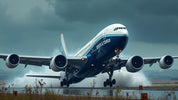
Boeing's 2024 Turbulence: Can the Aerospace Giant Navigate a Safe Landing?
, by Unboxify, 4 min reading time

, by Unboxify, 4 min reading time
After our last deep dive into Boeing’s transition from an innovative engineering powerhouse to a corporate entity focused on enriching investors, the world has become increasingly aware of the alarming trajectory the company is on. In just a week since our previous exposé, Boeing faced a sequence of incidents that captured global attention and led many to question the safety and reliability of their aircraft.
On March 4th, passengers aboard a United Airlines flight from Texas to Florida experienced a terrifying moment when they witnessed bright orange flames shooting out of the plane's engine. Just a few days later, another Boeing 737 Max operated by United Airlines slid off the runway due to a malfunction in the landing gear. This was followed by another incident where a tire detached from a Boeing 77 during takeoff from San Francisco Airport, landing on cars parked below.
In addition to these mechanical mishaps, a Boeing 7879 Dreamliner experienced a sudden plunge during a flight between Australia and New Zealand, injuring over 50 passengers. The frequency and severity of these issues have been increasing, raising significant safety concerns.
John Barnett, a former Boeing quality manager turned whistleblower, has been vocal about the company's subpar practices. Barnett worked with Boeing for over 30 years and has continuously raised concerns about the company’s standards. According to Barnett, Boeing’s practices were compromising safety, often deliberately fitting substandard parts to aircrafts on the production line.
Tragically, just as Barnett was about to testify against Boeing, he was found dead from a self-inflicted gunshot wound, leaving many questions unanswered. His death is still under investigation, but it has undoubtedly cast a shadow over the case and his claims.
An FAA audit recently revealed multiple instances where Boeing and its vendors failed to comply with manufacturing quality control requirements. The audit highlighted a shocking practice where dishwashing soap was used as a lubricant for a 737 Max door. The FAA’s findings have led to increased scrutiny, prompting Boeing to release a statement about implementing immediate changes to strengthen safety and quality.
Boeing's Statement:
"Based on the FAA audit, our quality standown, and recent expert panel report, we continue to implement immediate changes and develop a comprehensive action plan to strengthen safety and quality and build the confidence of our customers and their passengers."
The US Department of Justice has announced a criminal investigation into the Alaska Airlines door plug incident from January. Boeing has acknowledged that they cannot locate the records for the work done on the door panel, further raising suspicions. The investigation also aims to review whether Boeing complied with a previous settlement from its 737 Max aircraft safety debacle.
Boeing is now facing ongoing legal battles, public scrutiny, and a significant drop in its stock price—25% since the start of 2024. Ironically, the company’s cost-cutting measures aimed at maximizing shareholder value have backfired spectacularly, harming its reputation and bottom line.
Boeing’s cozy relationship with the US government and its key role as a top exporter and defense contractor provide it with some insulation against total collapse. However, the continuous negative headlines and public outcry signal that Boeing still has a lot of work to do to regain public trust.
Boeing's management must act swiftly to restore public confidence. Their attempts to save face can only go so far without genuine improvements in safety and quality control. Trust, once broken, is notoriously difficult to rebuild, and the aviation giant must now win back not just everyday passengers, but also airline operators, regulators, and the media.
Will Boeing manage to overcome this turbulent chapter, or will they continue their descent? Only time will tell, but one thing is certain: the company needs to make significant changes—and fast.
We want to hear from you about your experiences and opinions on Boeing's current situation. Have you worked for Boeing in any capacity? Do you trust their planes? Share your thoughts with us!







